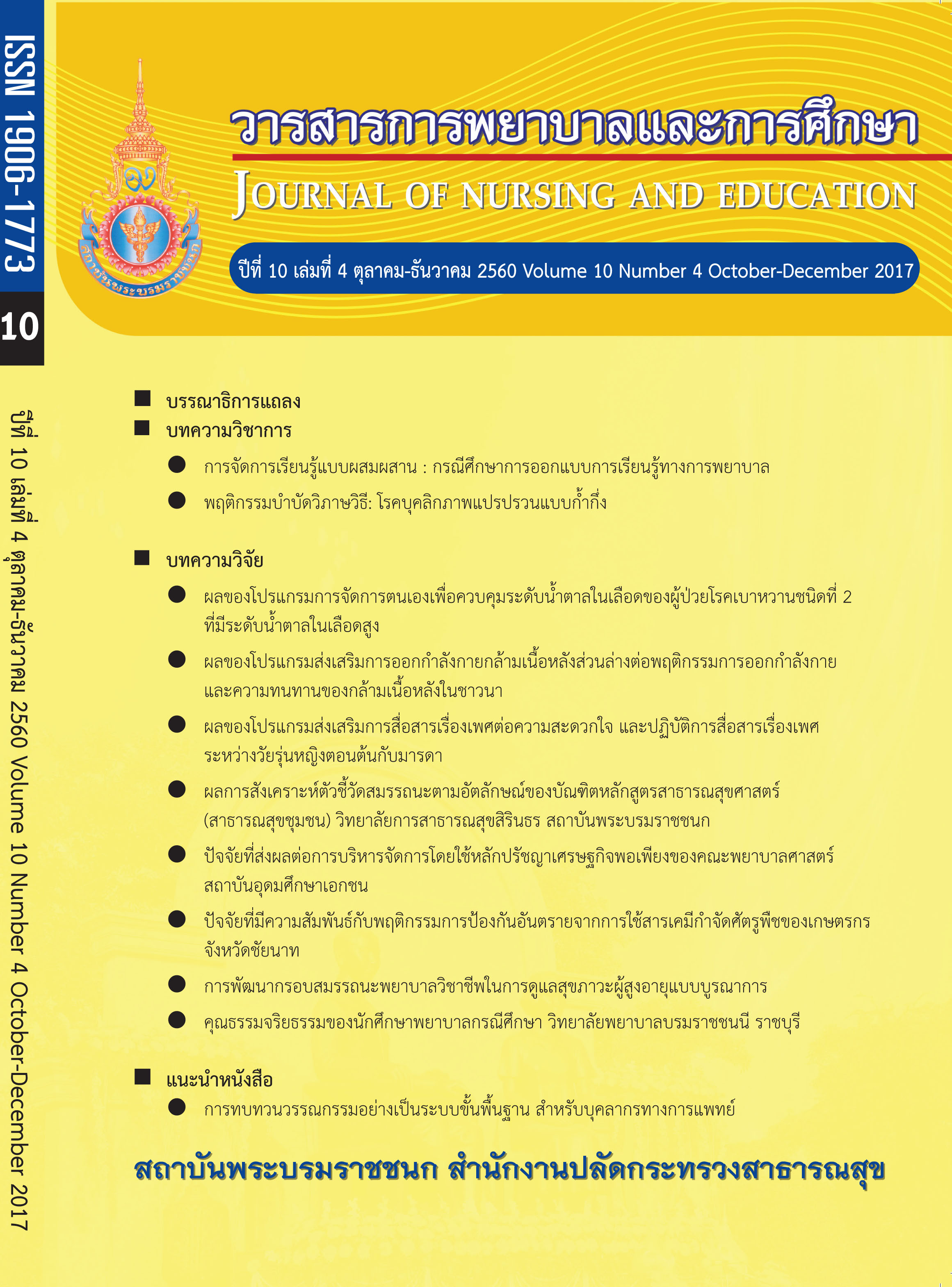ผลการสังเคราะห์ตัวชี้วัดสมรรถนะตามอัตลักษณ์ของบัณฑิตหลักสูตรสาธารณสุขศาสตร์ (สาธารณสุขชุมชน) วิทยาลัยการสาธารณสุขสิรินธรสถาบันพระบรมราชชนก
The Synthesis of Graduated Identities Competencies Indicators for Bachelor of Public Health (Community Public Health),Sirindhorn Public Health College, Praboromarajchanok Institute
Abstract
บทคัดย่อ
งานวิจัยเชิงคุณภาพ(Qualitative research)นี้มีวัตถุประสงค์เพื่อสังเคราะห์ตัวชี้วัดสมรรถนะตามอัตลักษณ์บัณฑิตหลักสูตรสาธารณสุขศาสตร์ (สาธารณสุขชุมชน) วิทยาลัยการสาธารณสุขสิรินธรสถาบันพระบรมราชชนกเก็บรวบรวมข้อมูลโดยใช้การสังเคราะห์เอกสาร (Documents synthesis)จากฐานข้อมูลออนไลน์ ฐานข้อมูลงานวิจัยของบริษัทEBSCO-Host ฐานข้อมูล World Health Organization(WHO)ร่วมกับการสัมภาษณ์แบบกึ่งโครงสร้าง(Semi- structured Interview) จากกลุ่มผู้เชี่ยวชาญ9 คน ประกอบด้วย ผู้เชี่ยวชาญด้านจิตบริการ (Service mind) 3 คน ผู้เชี่ยวชาญด้านการคิดเชิงวิเคราะห์ (Analytical thinking) 3 คน และผู้เชี่ยวชาญด้านการคำนึงถึงสิทธิผู้รับบริการและการมีส่วนร่วมของผู้รับบริการ(Patient right/Participation ) 3 คนร่วมกับผู้ที่มีส่วนเกี่ยวข้องหลักสูตร 14 คนประกอบด้วย ผู้บริหารวิทยาลัยการสาธารณสุขสิรินธร 7 คน (แห่งละ1 คน) คณาจารย์ประจำวิทยาลัยการสาธารณสุขสิรินธร 7 คน (แห่งละ1 คน) รวม 23คน ซึ่งได้มาโดยการเลือกแบบเจาะจง (Purposive sampling)วิเคราะห์ข้อมูลโดยดำเนินการวิเคราะห์เชิงเนื้อหา (Content analysis )ร่วมกับการสรุปอุปมัย(Analytic induction) และเปรียบเทียบความคงที่ของข้อมูล (constant comparative) กับข้อมูลที่ได้มา
ผลการวิจัย พบว่าอัตลักษณ์บัณฑิตหลักสูตรสาธารณสุขศาสตร์ (สาธารณสุขชุมชน) วิทยาลัยการสาธารณสุขสิรินธรสถาบันพระบรมราชชนกสามารถจำแนกได้เป็น 3 องค์ประกอบหลัก 7 องค์ประกอบย่อย 45 ตัวชี้วัด ดังนี้ 1)องค์ประกอบหลักทางด้านจิตบริการ ประกอบด้วย1.1 องค์ประกอบย่อยด้านจรรยาบรรณวิชาชีพ6 ตัวชี้วัด1.2 องค์ประกอบย่อยด้านคุณสมบัตินักสาธารณสุข7ตัวชี้วัด1.3 องค์ประกอบย่อยด้านคุณภาพในการบริการดุจญาติมิตร 10 ตัวชี้วัด2)องค์ประกอบหลักทางด้านการคิดเชิงวิเคราะห์ ประกอบด้วย2.1 องค์ประกอบย่อยด้านคุณลักษณะของนักคิดเชิงวิเคราะห์5 ตัวชี้วัด2.2 องค์ประกอบย่อยด้านกระบวนการคิดเชิงวิเคราะห์6 ตัวชี้วัด3)องค์ประกอบหลักทางด้านการคำนึงถึงสิทธิผู้รับบริการและการมีส่วนร่วมของผู้รับบริการประกอบด้วย3.1 องค์ประกอบย่อยด้านการพิทักษ์สิทธิผู้ป่วย4 ตัวชี้วัด และ3.2 องค์ประกอบย่อยด้านการส่งเสริมดูแลตนเองเชิงสุขภาพแบบองค์รวม7 ตัวชี้วัดดังนั้นวิทยาลัยการสาธารณสุขสิรินธร สังกัดสถาบันพระบรมราชชนกควรนำไปพิจารณาหรือประยุกต์ใช้ตัวชี้วัดโดยมีการสร้างเครื่องมือในการประเมินและสะท้อนผลการประเมินตามตัวชี้วัดองค์ประกอบตามอัตลักษณ์บัณฑิตหลักสูตรสาธารณสุขศาสตร์ (สาธารณสุขชุมชน) วิทยาลัยการสาธารณสุขสิรินธร สถาบันพระบรมราชชนกต่อไป
ABSTRACT
This qualitative study aimed to synthesize graduate identities competencies indicators for Bachelor of Public Health (community public health), Sirindhorn Public Health College (SPHC) Praboromarajchanok Institute (PBRI). The data was collected using documents synthesis on online database, EBSCO database and WHO database. Moreover, a semi-structured interview was conducted on 23 interviewees, selected by purposive sampling, including 9 experts; 3 experts in service mind, 3 experts in analytical thinking and 3 experts in patient right and participation, together with 14 stakeholders involved in the curriculum; 7 SPHC directors and 7 SPHC instructors (one from each SPHC). The data were analysed by the content analysis , analytic induction , and constant comparativemethod
The results revealed that the graduate identities competencies indicators for Bachelor of Public Health (community public health) could be classified into 3 main components, 7 subcomponents and 45 indicators. The first main component was Service mind which included 3 subcomponents; 1.1 professional ethics 6 indicators, 1.2 public health officer qualification 7 indicators and 1.3 quality of service-minded caring 10 indicators. The second main component was Analytical thinking with 2 subcomponents; 2.1 characteristic of analytical thinker 5 indicators and 2.2 analytical thinking process 6 indicators. The last main component was Consideration of patient right and participation including 2 subcomponents; 3.1 patient advocacy 4 indicators and 3.2 promotion of holistic self-participatory care 7 indicators. We, Sirindhorn Public Health College, Praboromarajchanok Institute (PBRI) suggest that it has to be considered or applied indicators by using the way of instrumental construction for evaluation and the result reflection followed by graduate identities competencies indicators for Bachelor of Public Health (community public health) ), Sirindhorn Public Health College (SPHC) Praboromarajchanok Institute (PBRI).
References
1. Bureau of Higher Education Standards and Quality, Office of the Higher Education Commission. Manual of Internal Quality Audit, Higher Education, 2014. Nonthaburi: Parbpim Limited Partnership, 2015. (in Thai)
2. Praboromarajchanok Institute for Health Workforce Development. A Strategic Plan for PBRI Development (B.E.2554-2558). Bangkok: The Agricultural Co-operative Federation of Thailand, 2011. (in Thai)
3. Taylor, R. C., et al. Fundamentals of Nursing, the Art and Science of Nursing Care. 7th ed. Philadelphia: Wolters Kluwer Health, 2011.
4. Nu Charoen, S. Self-Care: Knowledge and Art of Nursing. 5th ed. Bangkok: VJ Printing, 1995. (in Thai)
5. Aeumrod, K., Chaowakiratipong, T., and Meejang, S. Development the Indicators Affecting Public Health Technical Officer Competency in Primary Care Unit. The Public Health Journal of Burapha University, 2011; 6(2): 12-19. (in Thai)
6. Leininger, M. & McFarland, R. Culture Care Diversity and Universality: A Worldwide Nursing Theory. London: Jones and Bartlett Publishers, 2006.
7. Junthakarnbundit, P. Development the Indicators of IPD-Service Quality from the Community Hospitals in Pitsanulok Province. Journal of Nursing and Health, 2011; 5(3): 80-91. (in Thai)
8. Office of the Royal Society. Educational Terminology Dictionary, Version of an Office of the Royal Society. Bangkok: Arun Karnpim, 2012. (in Thai)
9. Pornkul, C. Teaching in Thinking Process, Theory and Application. 2nd ed. Bangkok: V-print, 2011. (in Thai)
10. Lomsai, K. Factors Influencing to Thinking System Development in the Elementary Educational Setting. Ph.D. Dissertation (Educational Administration), Graduate School, Silpakorn University, 2009. (in Thai)
11. Nursing and Midwifery Council. The Way of Nursing Practice Promotion beyond Professional Ethic (Revised Edition). Bangkok: Chudthong Karnpim, 2008. (in Thai)
12. Hakan, Ozdemir M., et al. Midwives and Nurses Awareness of Patients' Rights. Midwifery Journal, 2009; 25(6): 756-765.
13. Josse, Eklund A., et al. Individual and Organizational Factors Influencing Registered Nurses’ Attitudes towards Patient Advocacy in Swedish Community Health Care of Elders. Scandinavian Journal of Caring Science, 2013; 28(1): 371-380.






